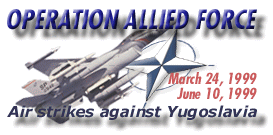Chronology
The air strikes against Yugoslavia did not come as a surprise. Listed next are some of the events that eventually led to the air strikes.
October 13, 1998 - NATO's decision-making body, the North Atlantic Council, issued an Activation Order for limited air strikes and a phased air campaign against Yugoslavia (Operation Determined Force).
October 15, 1998 - An agreement was signed between NATO's SACEUR and the Yugoslav Chief of General Staff over a verification mission, complementing an OSCE verification mission.
October 24, 1998 - The United Nations Security Council adopted Resolution 1203, supporting the NATO and OSCE verification missions.
October 27, 1998 - NATO maintained the Activation Order for the phased air campaign against Yugoslavia.
January 20, 1999 - NATO increased readiness of the assigned forces. Forces were brought on 48 hour status.
January 29, 1999 - The international Contact Group called upon all parties to agree on a political settlement for Kosovo by February 20, 1999. NATO's NAC agreed that Secretary General Solana could order air strikes any time.
February 20, 1999 - The Contact Group extended the negotiations until February 23, 1999.
February 23, 1999 - Negotiations were again extended by the Contact Group until March 15, 1999. During this time, both the Serb and Kosovo parties were granted the time to approve the peace plan. The Serb delegation did not seem willing to accept the peace plan.
March 18, 1999 - After difficult negotiations in Rambouillet (France) and several delays the Kosovo Albanians signed a peace deal unilaterally calling for an interim autonomy during three years and 28,000 NATO troops to implement it. The Serb delegation refused to sign and the peace talks were suspended indefinitely.
March 22, 1999 - The US special envoy Richard Holbrooke warned Yugoslav president Milosevic of air strikes unless he signed the peace agreement after all. Milosevic refused.
March 23, 1999 - NATO authorized air strikes against Yugoslavia. The Secretary General ordered military commanders to initiate air operations. See NATO press release March 23 by Secretary-General Janvier Solana.
March 24, 1999 - NATO actually commenced the air strikes. See NATO press release March 24 and >NATO press release March 25 by Secretary-General Janvier Solana.
Also see the NATO statement of March 25, issued by the Heads of State and Government participating in the meeting of the North Atlantic Council on April 23 and 24 April. This statement also mentions the five NATO requirements with which Yugoslav President Milosevic must comply.

